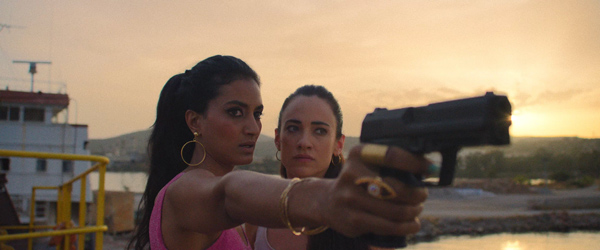The Female of the Species: Kalogiropoulou Hits the Gas in Brooding Debut
How, exactly, does a powerful woman command the patriarchy? It turns out, only through complete decimation, as opposed to adopting the same hierarchical values— the surefire path to victory, at least as examined in Evi Kalogiropoulou‘s sinister debut, Gorgonà. Set in a dwindling Greek city-state, where petrol, the region’s only economic resource, is fiercely controlled by a group of violent men, are threatened by a resilient, beautiful woman with a sordid past when she’s granted the opportunity to inherit this unstable kingdom. Her goal is revealed to be a pie-in-the-sky promise, leading to an inevitable stand off during a ceremony intended to crown the gang’s new leader. A neon-lit demimonde masks the dubious future of a region in significant decline, but it appears there is a breaking point for the local women, who’ve had their fill of sexual violence and maltreatment.
Nikos (Christos Loulis) is the leader of a violent gang who control the export of petrol in their small, otherwise disenfranchised area. Unfortunately, he’s suffering from a debilitating illness and his days are numbered, requiring him to choose a worthy successor from his clan. Stages of various contests to determine the requisite skill sets of the next leader are immediately thwarted by the inclusion of Maria (Melissanthi Mahut), who is not-so-secretly sleeping with Nikos. The men demean and disparage her, and yet she seems to be a frontrunner for the role. However, Nikos was partially responsible for the violent death of Maria’s mother, a sex worker whose other daughters have been relegated to the same profession. When Eleni (Aurora Marion), a chanteuse from outside the region, is brought into the men’s inner circle for their apparent entertainment, the two women embark on an affair, which changes bother their destinies.

Visually, Gorgonà is often ravishing, and Kalogiropoulou’s background in music videos seems readily apparent. DP Giorgos Valsamis certainly makes the milieu seem seductively inviting for those who are allowed to exist at the top of its food chain. But all is not right in this empire, where the petrol is so fiercely guarded the populace is running out of food. Nikos’ gang feeds on a soupy protein substance at the local cafeteria, which looks like a mushy pudding, seemingly a more viscous version of the fossil fuel they depend upon.
Eleni serves as an ersatz narrator, announcing she was sold into sex slavery by her parents for some fruit and petrol as a child. She seems resigned to her fate until she meets Maria, and the two commingle like the lesbian version of Thelma & Louise (1991). Nikos’ purported illness necessitates a quick replacement, though it appears his successor must excel at marksmanship and the ability to control the unruly horde. The prospects for Maria’s succession seem dubious from the onset, and yet the contests continue. The central female relationship, along with the film’s pronouncedly evocative images recalls Finnish director Zaida Bergroth’s 2017 feature Miami, but with a much darker trajectory. Minimal special effects evoke the inferno blazing behind Maria’s eyes, and like the titular gorgon of the title, fire, rather than Medusa’s stony power, allows for an ultimate reckoning.
Nikos apparently carries guilt regarding the demise of Maria’s mother, a witchy beauty who was burned to death years prior by his men…but she was able to direct the fire to also engulf her tormentors. Maria seems to have a similar telekinetic ability, but Kalogiropoulou depicts this as a power which is purely destructive, never ameliorative. In other words, Maria can’t seem to save herself from violence, but she can sometimes inflict it. This supernatural element eventually feels more metaphorical, as it’s the women banding together in support of Maria which allows them eventual leverage. A crescendo of violence plays out to “In the Still of the Night” by The Five Satins, adding a sense of archaic value and ironic turmoil to a toxic community which can only evolve if it’s burned to the ground and allowed to begin again. Ultimately, the female of the species is deadlier than the male.
Reviewed on August 31st at the 2025 Venice Film Festival (82nd edition) – International Critics’ Week. 95 Mins.
★★★½/☆☆☆☆☆


